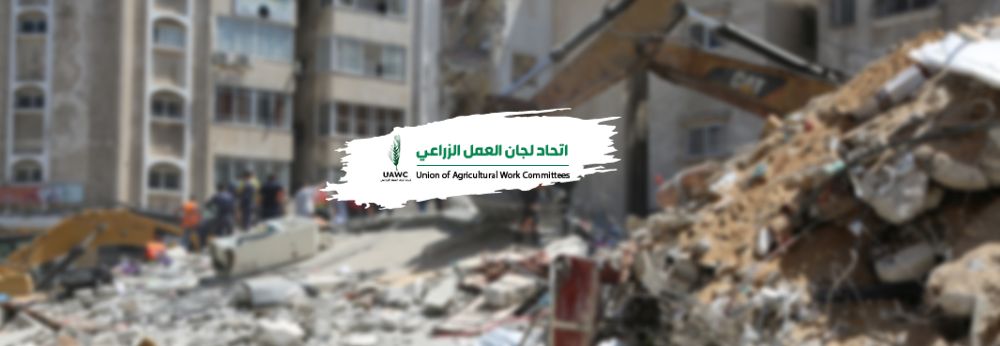Statement by the Union of Agricultural Work Committees (UAWC), Palestine
Urgent Statement on Israel’s Use of Starvation as a Weapon of War in Gaza
11 October 2023
For five days, Israel has attacked Gaza with the aim of total destruction, and the situation is at an unprecedented level of urgency. Israel’s actions have amounted to a humanitarian catastrophe of unfathomable proportions. At the time of publication, the Palestinian Ministry of Health reports 1,055 martyrs and approximately 5,184 injured.
Israel has declared a total warfare stance on Gaza, imposing a ruthless blockade that denies over two million Palestinian residents of Gaza access to electricity, water, food, fuel, medical supplies, and any humanitarian aid. Israeli Defense Minister Yoav Gallant explicitly stated this strategy on 9 October 2023, saying: “We are imposing a complete siege on [Gaza]. No electricity, no food, no water, no fuel – everything is closed. We are fighting human animals, and we act accordingly.”
Israel’s deliberate use of starvation as a weapon of war demands the international community immediately respond with unwavering urgency and resolve.
Israel is indiscriminately decimating hospitals, schools, mosques, markets, and entire neighborhoods. Further, Israel threatened Egypt that it would bomb humanitarian aid deliveries to Gaza, prompting Egypt to withdraw its aid convoys. The Rafah Crossing into Egypt, the sole international exit from Gaza, has been bombed by Israel three times in a 24-hour period. This calculated assault severs Gazans’ only means of escape from ceaseless bombings or access to essential humanitarian aid. With Israel cutting off Gaza’s source of electricity, the only source of power was the Gaza Power Plant, which has just run out of fuel. In the case that it receives more fuel, Israel has threatened to attack the plant.
Israel’s assault is deliberately destroying any infrastructure that allows Gazans to support themselves. Vital agricultural and fishing infrastructure, crucial for food production, have been mercilessly attacked. Fisher folk cannot access the sea, into which sewage is spilling. The seaport is damaged, and tools are obliterated. Farming areas, often near the fence, have become vulnerable targets in Israeli airstrikes, and farmers whose land has not been destroyed cannot access it for daily agricultural practices. The Ministry of Agriculture reports that the bombing has done immense damage to agricultural areas and poultry farms, but the conditions make it impossible to precisely assess the situation in the field. There is a catastrophic decrease in food stocks, with shops across Gaza reporting severe shortages. The land and sea will face unimaginable environmental damages following these attacks, further preventing efforts to rebuild livelihoods.
Israel’s strategy aims to ensure that those who survive the bombs are condemned to a future without sustenance.
OCHA reports that the assaults have disrupted the UNRWA food operation, impacting at least 112,759 families. The poultry and livestock sectors are on the brink of collapse due to the severe shortage of fodder, endangering the livelihoods of more than 1,000 herders and affecting over 10,000 producers. This jeopardizes the provision of animal protein and the availability of meat and fresh sources of protein for Gaza’s entire population. Transportation of poultry to markets has virtually halted, and dairy cattle milk cannot be refrigerated nor marketed to factories, resulting in an expected daily spoilage of 35,000 liters of milk. More than 4,000 fisheries are at risk due to the closure of the sea. Gaza’s agriculture, poultry, cattle, fish, and other products are suffering from a lack of refrigeration, irrigation, incubation, and other machinery due to electricity cuts, causing spoilage.
Israel’s use of these tactics is not new by any means. Before Saturday, around 65% of the Gazan population was food insecure. More than 46% of the agricultural land in Gaza was inaccessible, and the fishing industry was severely struggling since fishing off the coast of Gaza has been restricted by Israel to 3 to 6 nautical miles.
Food insecurity is a human-made crisis, and Israel is manufacturing a mass starvation of the Gazan people.
It is the moral and legal obligation of the international community to intervene and end this crisis immediately. Food, as a basic necessity, must be allowed to reach the people of Gaza, and the deliberate targeting of civilian infrastructure must cease without delay.
We call upon the international community to take immediate action to stop Israel’s massacre of the Gazan population, demand the lifting of the siege, and establish humanitarian corridors for entry of aid.

